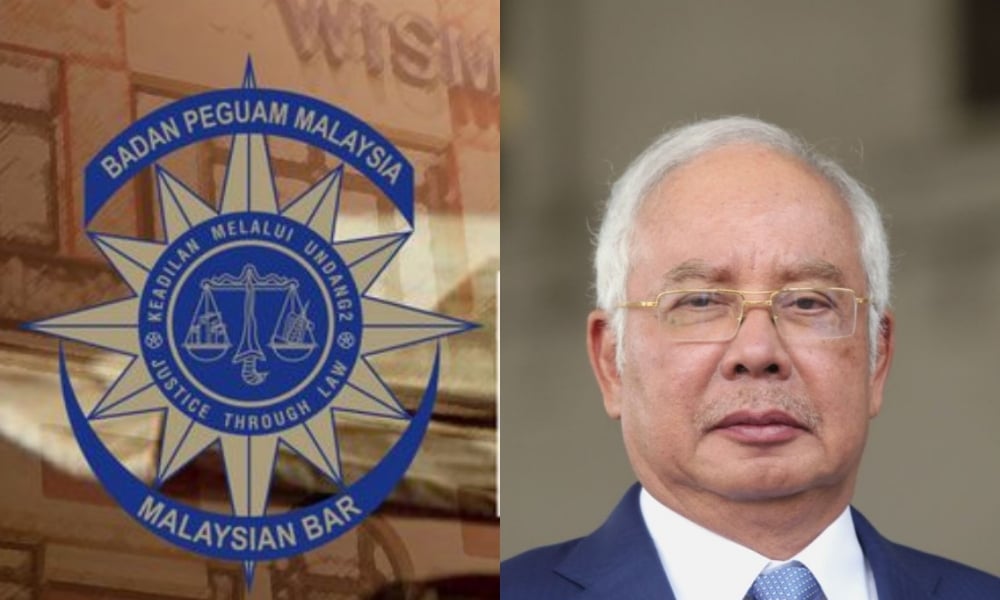KUALA LUMPUR, MALAYSIA: The Malaysian Bar on Saturday (16 March) resolved to legally contest the Pardons Board’s decision, which reduced former Prime Minister Datuk Seri Najib Razak’s 12-year jail term and RM210 million fine related to the misappropriation of SRC International Sdn Bhd’s RM42 million.
During the 78th annual general meeting (AGM), nearly all members of the legal professional body for Peninsular Malaysia supported the resolution for the Bar Council to promptly initiate the court challenge.
Mohamad Ezri Abdul Wahab, the new president of the Malaysian Bar, disclosed that 238 members voted in favour of the resolution, with just one member opposing the decision to file the court case.
As outlined in the AGM resolution available on the Malaysian Bar’s official website, the organization criticized Najib Razak for actions leading to Malaysian taxpayers shouldering the burden of 1MDB debts surpassing RM50 billion.
Additionally, they highlighted the ongoing Tanore trial, where Najib Razak is accused of receiving USD600 million of 1MDB’s funds.
The Malaysian Bar further questioned the processing of Najib Razak’s pardon application, considering he had served only 1½ years of his jail sentence.
The Malaysian Bar emphasized that the 1MDB scandal has severely damaged Malaysia’s international reputation, citing remarks by Loretta Lynch, the former US Attorney General, and the description of the scandal as the largest kleptocracy investigated in US history.
“(The case) being the subject of a Netflix Documentary “Men on the Run”. Indeed, the Court of Appeal in the SRC appeal called it “a national embarrassment”.”
Regarding the Pardons Board’s decision, the Malaysian Bar deemed it to have acted “ultra vires” Article 42 of the Federal Constitution and in contravention of the law.
Former Malaysian Bar president Zainur Zakaria proposed the resolution, which was seconded by former Malaysian Bar president Yeo Yang Poh.
According to reports by Malaysian media outlet Malay Mail, Ezri mentioned plans to file the judicial review within the next two weeks.
He further stated that the Malaysian Bar will rely on legal advice to refine the specifics of the planned court challenge.
When asked why the Malaysian Bar took the initiative to file the court challenge against the Pardons Board’s decision rather than leaving it to individuals or non-governmental organizations, Ezri emphasized the Bar’s commitment to upholding the rule of law without bias or influence.
“It’s because of our duty without fear or favour and us protecting the rule of law, so that’s why I think the floor has decided in that manner that we need to file in the judicial review.”
Addressing concerns that the court challenge might be perceived as challenging the Agong’s pardon powers, Ezri clarified that the planned challenge is specifically directed at the Pardons Board’s decision and not the Agong’s authority.
He emphasized that the goal is to scrutinize whether the Pardons Board’s decision aligns with legal requirements and public interest.
“So as far as we come to know, is that, all who have heard the decision made by the Pardons Board is not happy, so we are going to help ascertain what is the right thing that should happen,” he said.
Ezri underscored the distinction between the powers of the Agong to grant pardons and the role of the Pardons Board in making recommendations.
“According to the law, the Pardons will make a recommendation and the Agong will make a decision, but as far as we know, the Pardons Board has made decision not within what is supposed to be done, so that is why we are reviewing it.”
“The motion specifically named the Pardons Board, no other parties,” he added.
Regarding the resolution condemning proposed changes to citizenship laws and addressing statelessness, the Malaysian Bar unanimously supported the condemnation of the Malaysian government’s proposed amendments to citizenship laws as “regressive.”
Additionally, the Bar expressed its readiness to consider initiating or joining legal proceedings aimed at ending statelessness in Malaysia.
During the AGM, all attending members voted in favour of adopting the resolution on citizenship laws and statelessness, which outlined five main points.
The fifth point emphasized the Malaysian Bar’s commitment to consider and, if deemed appropriate, initiate or participate in court proceedings to address Malaysia’s issue of statelessness, aiming to eliminate this “shameful legacy.”

